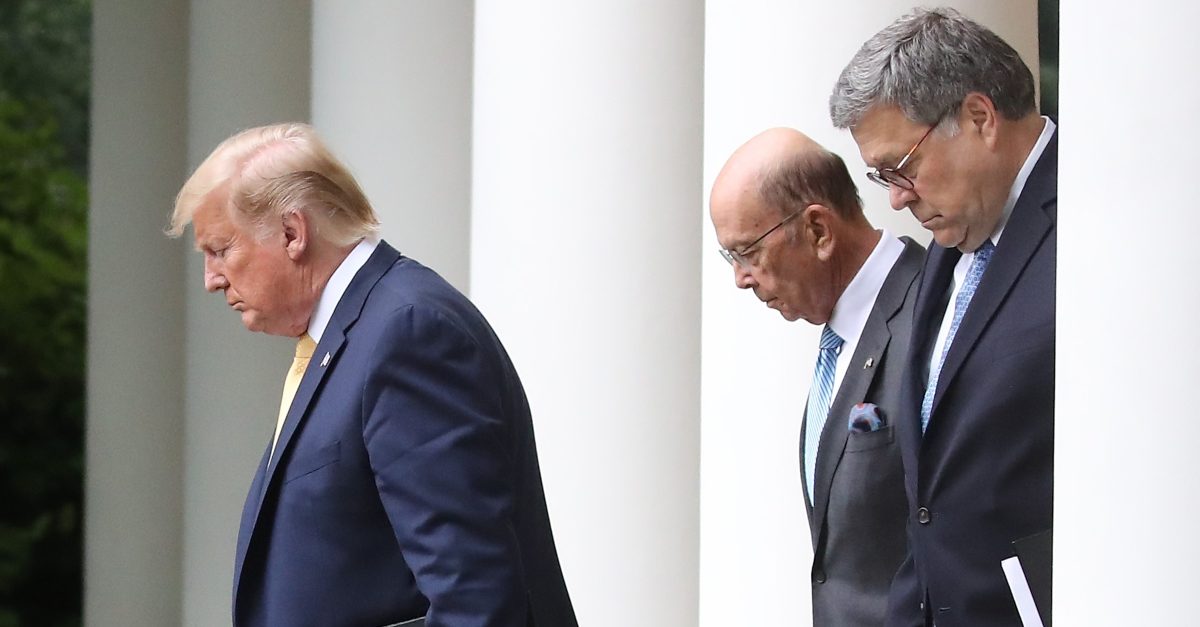
A federal judge in New York on Thursday ordered the Department of Justice to pay sanctions to a coalition of voting rights groups who successfully sued to stop the Trump administration from adding a question about citizenship status to the 2020 census questionnaire.
The administration initially argued that adding the citizenship question was necessary to “help enforce the Voting Rights Act of 1965.” Plaintiffs claimed a citizenship question would hinder the census’s accuracy. They also said it was actually being used to surreptitiously deter the participation of minority populations, thereby favoring voting power in Republican districts.
In a 23-page decision, Barack Obama-appointed U.S. District Judge Jesse Furman penalized the department for failing to provide more than 900 relevant documents–roughly 3,700 pages–which should have been produced at trial. The documents, which were released by congressional investigators after Judge Furman and the U.S. Supreme Court had already ruled in the plaintiffs’ favor, directly contradicted the government’s stated rationale for adding the question.
The documents revealed that redistricting specialist Thomas Hofeller – the so-called godfather of modern day gerrymandering – had helped the DOJ draft the memo sent to the Commerce Department claiming that the addition of the citizenship question would help enforce the Voting Rights Act.
“Other evidence obtained by the [Plaintiffs], however, suggested that Dr. Hofeller’s true motive in promoting a census citizenship question was to facilitate redistricting strategies that would, in his words, be ‘advantageous to Republicans and non-Hispanic Whites.’ The NGO Plaintiffs argued that this and other evidence revealed that two of Defendants’ witnesses, [Mark] Neuman and [John] Gore, ‘provided false testimony’ in their depositions and concealed evidence in discovery,” Furman wrote.
After a second batch of documents were released that further undercut the administration’s claims, the DOJ said they “discovered” the missing documents and the failure to initially produce them was due to a “technical error.”
“Although the documents had been collected and loaded onto Defendants’ document-review platform, a coding error in the ‘custodian’ field led to searches that returned incomplete results for production. In other words, Defendants’ failure to produce the documents was caused by a lapse that would make a first-year litigation associate wince,” Furman wrote. “Accordingly, the Court will — and arguably ‘must,’ [under] Fed. R. Civ. P. 37(b)(2)(C) — order Defendants to pay the reasonable costs and attorney’s fees caused by their lapse.”
Furman, it should be noted, did decline to sanction the government based on the allegation that the Commerce Department “concealed evidence and that two witnesses provided false testimony,” reasoning that “the proper remedy is exactly what happened at trial.”
“To be sure, this was not DOJ’s finest hour. At best, DOJ failed to produce more than ten percent of the documents that Defendants were required to produce as part of this litigation. But the Court cannot conclude from the record before it that further investigation into possible sanctionable conduct is warranted in the circumstances of this case,” Furman wrote. “Accordingly, and as an exercise of the Court’s ‘wide discretion’ […] the Court will not impose sanctions on Defendants beyond the litigation defeat they have already suffered, or the fee award in which they have acquiesced — except to order that Defendants pay the costs and fees associated with a portion of this motion and its embedded disputes. Nor will the Court invite further discovery in order to determine exactly who did what and when with respect to the decision to add a citizenship question to the decennial census.”
The judge still took several more shots at the administration’s conduct in his conclusion:
Plaintiffs tested the credibility of Defendants’ explanations, including the testimony of Defendants’ witnesses; persuaded the Court that Defendants’ official story concealed their true reasons for acting; and — on that basis — ultimately prevailed. See, e.g., New York, 351 F.Supp. 3d at 565 (finding the testimony of one witness ‘materially misleading’); id. at 556 (noting Gore’s admission that he did not believe adding the citizenship question was necessary to improve Voting Rights Act enforcement efforts, the stated rationale for doing so). Indeed, evidence that apportionment effects might have been a reason for Secretary Ross’s decision supported the Court’s conclusion that improving Voting Rights Act enforcement was not his actual reason. See id. at 568, ¶ 170. Thus, not only did the NGO Plaintiffs ultimately ‘obtain[] all the relief they sought when they brought this case,’ but they did so in part for the same reasons they now seek further sanctions against Defendants. In the final analysis, although the NGO Plaintiffs’ allegations are troubling, so too were the facts that won them a victory at trial and in the Supreme Court. Plaintiffs’ theory of the case could hardly need more judicial vindication than that.
See the full ruling below.
5 21 20 New York v Commerce… by Law&Crime on Scribd
[image via Mark Wilson_Getty Images]